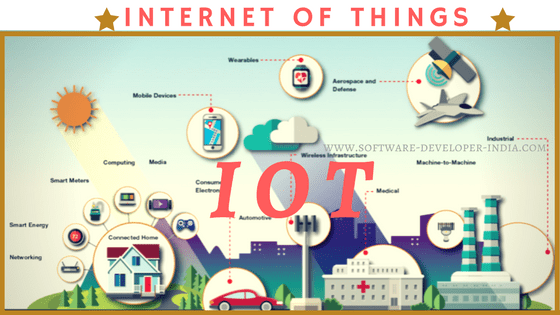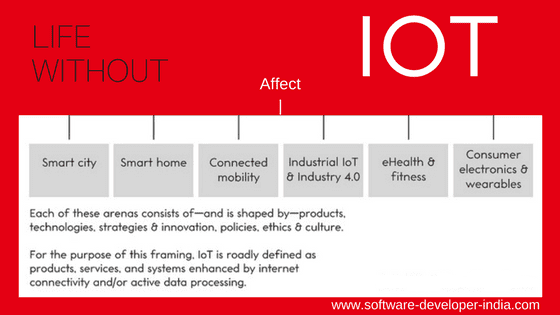What is the Internet of Things (IoT)?

For the last few years, the Internet of Things (IoT) has been getting a lot of hype even though the concept has not been a new one. In fact IoT has been around for a long time, but in subtler way. IoT has revolutionized several industries including the IT industry, marketing, health care, education, agriculture and plenty more. IoT is not a complicated thing at all – it means connecting devices with the help of Internet, and with the arrival of broadband Internet connectivity, the concept has evolved far beyond anything you could have imagined.
IoT in our life makes significant impact
IoT has entered our lives in a way that made things so much easier. For example, you know what your smartphone can do, now think what a smart fridge can do – a smart fridge would be able to tell you when the milk in the container is over, when the meat gets spoiled, or when frozen products has gone past its “use by” date. Smart fridges would also let the owners choose what items he wants an inventory of. For example, if a person consumes more beer than milk, then he can set the parameters in such a way that he will be notified when his beer supply runs low. IoT has already made a significant impact in countries like England where they have already started using smart meters, remote devices that would turn the heater on in your bathroom, temperature devices that would let you set the temperature in your room so it would be cool/warm by the time you get home and so on. If devices are getting smarter, it is because of IoT.
Life without IoT is now unimaginable

IoT has thus made significant changes in all the industries it has touched. In fact, the paradigm shift in technology has been so fast-paced that it has been really hard to keep in touch. Of course, there are risks that go with the opportunities you have with IoT. Even then, about 54% of the mobile developers have invested both money and effort in this innovative concept. A few interesting statistics that you can expect regarding IoT:
- Cars are going to get smarter and by 2020, about 90% of the cars will be connected to smart devices
- Energy costs will be reduced because motion detector sensors would be fitted on street lights; these lights will be automatically activated when people or vehicles ply on the road
- About 94% of the businesses will have excellent Return on Investment with IoT
The evolution to IoT has been fast enough but in the last decade, the progress has been really quick. The progress from mainframes to workstations and then from there to client servers, grid computing and the revolutionary cloud computing. The capacity of computers has doubled every two years, according to Gordon Moore, the founder of Intel and with internet being accessible to people, there seems to have “intelligence” embedded in most of them. This was how devices became “smart”. Experts believe that you can see more than 26 billion IoT devices by the end of 2020. IoT makes new fields of applications possible and through that more freedom to the user. You can actually categorize this freedom in three different ways:
- You have the freedom to run any program in any way you want
- If you are able to understand the technicalities of a program, you can make changes to it and configure it so it would work according to your wish
- If you have made any changes to the existing program, you have the freedom to share the copies with others
This is called free software and IoT has made it possible
IoT has accelerated the use of open sourcing
Thanks to IoT, open sourcing from data can be acquired from different sources to help develop better, smarter systems like the ones sources to make devices like fridge sensors, environmental sensors possible. IoT has become the driver for open source because of the consumer’s desire to pair their devices with other devices of different makes (initially, they could only pair devices that came from the same vendor). Thanks to the pairing of open sourcing and IoT, there grew a vibrant developer community as well. Now software projects can enjoy faster innovations than the proprietary solutions developed by companies because several other developers are contributing to the same thing.
Businesses are listening to customers and creating innovative products
With the emergence of IoT, businesses have begun to listen to customer’s demands like never before. Would you ever have thought of a television that turns itself on at the sound of its owner or a smart gas stove that turns on and off remotely until a few years ago? Well, it is all possible now, and with competition threatening to stagger their very foundation, every business in the world is trying to come up with new and useful things.
Conclusion
Many of the changes that were introduced into our lives through IoT has only made it better. Look at the healthcare industry for instance. Doctors can provide state-of-the-art treatment to patients, help them in faster recovery and aid them to enjoy better quality life. Similarly, look at the changes made in agriculture through IoT. Farmers decide what kind of crops to plant, when to harvest, the amount of pesticides and manure to be applied and many more. The accelerated pace of IoT has increased the demand for security precautions that cannot be breached in anyway. Even for advanced security measures, people turn to internet-connected devices.
Interesting links about the topic:
Definition|Internet Of Things
What Is Meant By IOT?
What Is Meant By Internet Of Things?
Pictures: Flickr.com/the waving cat

The author: Reema Oamkumar is engaged as a thought leader at www.Software-Developer-India.com which is a part of the YUHIRO Group. YUHIRO is a German-Indian enterprise which provides programmers to IT companies, agencies and IT departments.
Leave a Reply